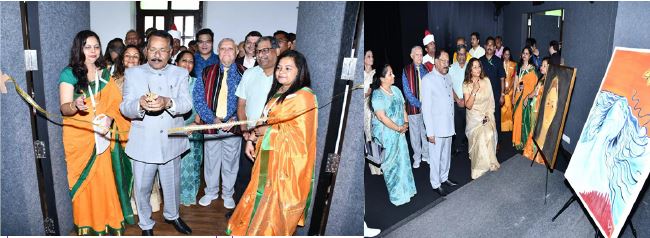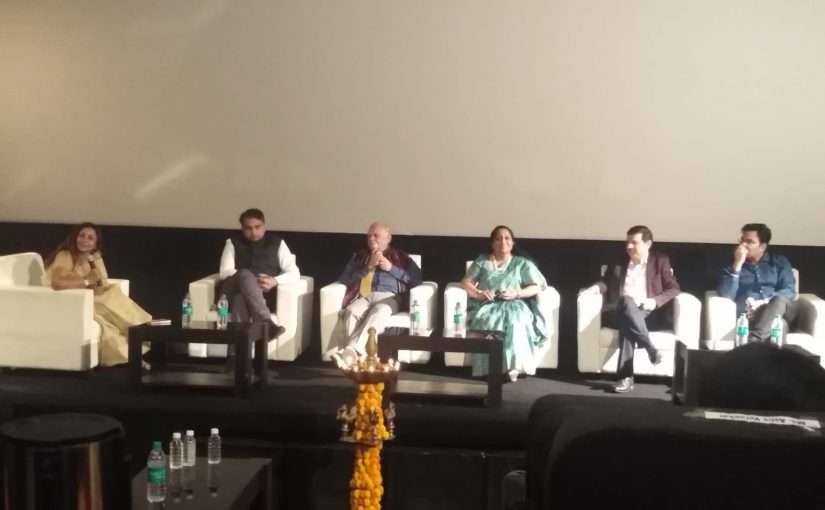By Pankajbala R Patel
1 in 9 will suffer cancer by 2040, in India we’re getting there too say new cancer studies; in fact we can say the human race has turned the world carcinogenic with unsustainable lifestyles by the few at the expense of the many….
FROM the sound of it we human beings cannot hope to escape from cancer if we continue to live the way most of us are choosing to live currently. So unsustainably! Providing we have a choice, which many of us may or may not have. We mess up the earth and the earth’s environment, we mess up our general and specific wellbeing. Of course, we mess up our mind, heart and soul, we mess up body beautiful too.
Increasingly the lifestyles of urban affluence go hand in hand with a stressed out state of mind for both rich and not so rich working classes…with our adrenal glands overproducing the stress hormone cortisol constantly right from childhood onwards, the adrenal glands go for a toss and various deprived from happiness cells here and there give up the good or bad fight to stay alive.
It is true that in the case of women as they grow older there’s a fall in estrogen which protected them for almost five decades from cancer-causing triggers. But at one of the 3-day Sanjeevani initiatives of organizing a national conference on Integrative Cancer in Goa there was a lot of insight into how to live better if we’re cancer survivor. The first thing to understand is that we have to, cancer survivors or not (maybe heart disease survivors, maybe diabetes survivers) we have to correct our negative ways of thinking which impact the diseases we suffer from negatively. It is a general truth: be happy and what we are suffer from we will suffer it better given the sunlight, salt and time or so to speak.
IN EVERY HOUSEHOLD
TODAY the disease of cancer is more or less in almost every household day given the statistics – a recent WHO study has it that every 7th citizen of the world is a cancer patient and India is catching up with the developed countries rapidly with cancer data. In urban and urbanizing India the cancer statistics will soar too to catch up with the ones in the developed countries.
In India too confirm many of the visiting oncologists and alternative medicine practitioners at the Sanjeevani conference of April 17-18-20, 2024 the statistics are highest in affluent, urban areas. Take affluent Punjab for example, and Haryana, and the big metro populations where various cancers dominate with pancreatic and gall bladder cancer being the most challenging to survive beyond a few months from the time of diagnosis which is very late.
THE fact is the developed countries of the West where most cancer patients show up at stage one and two there is brighter chance for remission, given the right combination of treatment – chemotherapy, radiotherapy and increasingly immunotherapy is coming of age. In India the visiting medical and cancer doctors at the conference observed that our cancer patients show up at the third and fourth stage when the cancer has spread to other areas of the body (that is called metastasis)…this makes it more frustrating as challenging to achieve remission of the much feared and dreaded disease of cancer which comes in a myriad combination of rogue cells. Cancer is primarily a disease of cells dying prematurely and multiplying slowly or aggressively.

TERRIBLE LIFESTYLES
AS we age we are more vulnerable to cancer although in modern times young people with terribly lifestyle habits are presenting with cancer in their 20s! Several of the visiting cancer doctors at National Conference on Integrative Cancer Care by Sanjeevani emphasized this. It is time for the younger generation to review their lifestyle habits and chuck for example, smoking, imbibing too much liquor, feasting on industrial junk food and beverages of the marketplace.
Making lifestyle changes helps keep the ravages of cancer at bay. If breast cancer rules in urban India, in rural India it is cervical cancer due to poor sanitation in homes. Listening to the various speakers at the Sanjeevani panel discussion on April 18 cannot help but reinforce one thing. And that is we human beings have made a mess of ourselves in mind and body, heart and soul…perhaps that’s why we fear cancer most even as we fight it in almost every home in today’s times.
If it is not diabetes, it is heart disease and as we grow old and older it is almost a natural outcome that our cells sicken in need and want of so many inputs material and immaterial. Happiness is not the least of all our needs and wants! In fact, the gallant, valiant founder of Sanjeevani initiative set up in 2012, Ruby Ahluwalia (a one-time civil servant — 1987 batch — who presented with breast cancer in the third stage and is a cancer survivor herself) stresses this again and again in her observations. Cancer survivors need holistic all around help to facilitate their recovery from cancer for in India.
STRESSFUL WORLD
IN our stressful world of financial anxieties it is true that stress is the biggest player in what kind of cancer eats into us….it is increasingly becoming clear that such emotions as constant anger, fear, the inability to cope with life and what cards it deals out to us varying from situation to situation, plays a crucial role in the outcome of cancer and most cancer survivors have to come to terms with this fact.
Cancer survivors have to learn to be happier human beings if they seek cancer remission and freedom from cancer. Never mind that this is easier said than done or possible in many situations of life and family responsibilities! Ruby Ahluwalia observed at one point, Indian women suffer from a frightening amount of family responsibility – it has a bearing on the outcome of the cancer they suffer from.
Again, according to one of the speakers in the panel conversation breast cancer is a cancer which catches up with many women in their 40s-50s, after they’ve finished coping with a slew of responsibilities like taking of in-laws, husband, children and extended family issues which are often fraught with heartbreaks and heartaches.
Oftentimes situations are so grim that the will to fight their cancer just goes out of them and here is when they need a support system from either government healthcare infrastructure in place or cancer survivors must enroll with organizations like Sanjeevani which is now coming to the rescue of cancer survivors to clue them up about a host of issues regarding cancer treatments, drugs, alternatives, post-cancer survival and what products can make life easier to live and deal with.
This is to Sanjeevani cancer initiatives to reach out to cancer patients now exist in 30 government and sem8-government hospitals across 15 states in India and according to records the organization has reached to over 11 lakh cancer patients with help required. Doctors attending the NCICC 2024 were full of praise for Ruby and her husband Anil Ahluwalia’s efforts with Sanjeevani to help cancer survivors with promises of help in all the ways they could to ameliorate the suffering of cancer survivors.
14 LAKH NEW CANCER PATIENTS EVERY YEAR…
And integrative cancer care is here finally!
SANJEEVANI’S gentle founder Rubu Ahluwalia has been ardently pushing for integrative cancer care in hospitals from Tata Memorial Hospital to other public and private hospitals over the years. Integrative cancer care is simply bringing in the alternative systems of preventive and curative medicine and healthcare as defined by the country’s AYUSH board (which sustains Ayurveda, Unani, Sidda, Homeopathy and other traditional systems).
In this respect there is some more good news as revealed at the panel discussion on April 18, with Dr Ashish Gulia (director, HBCHRC, Multanpur & Sangrur, Rajasthan), the Tata Memorial Hospitals are now investing in “vanaspati projects” whereby Ayurveda herbs are cultivated to see if they can help immunotherapy efforts to ease cancer patients’ poor immunity. He said some eight years ago when cancer was raging in Punjab and they had a cancer train of patients coming in for treatment, “We decided the world is changing, we must change…1 in 9 in India will definitely develop cancer, this is today’s growth rate. 14 lakh new cancer patients are adding to the cancer pool in India annually…say it is 100 patients per lakh population.” This is confirmed data now.
In the West, he said, it is 45 to 50 cancer patients per lakh; in Mumbai we’re getting 250 patients per lakh presenting with cancer. Indeed, the statistics are mindboggling. Perhaps hospitals in the developing counties are doing something right and we need to catch up, incorporate integrative cancer care for our cancer patients. Cancer treatment now is not limited to chemotherapy, radiotherapy, surgery but also immunotherapy efforts to boost cancer patients’ low immunity (which may in the first place have triggered their cancer; yes, due to poor nutrition or patronage of foods which offer zero or little nutritive value).
Immunotherapy or immunity boosting is now seen considered an important key to achieve freedom from cancer. Apart from treatment with drugs alternative engagements like better nutrition, doing yoga and pranayam or meditation helps cancer survivors recover faster. And this is what Sanjeevani’s initiatives in collaboration with more and more hospitals are keen on pushing to reach out to cancer survivors.
Interestingly, Ruby Ahluwalia herself has decided to reside in Goa now for she “loves swimming in the sea”(in reply to a query). Remember she is herself a breast cancer survivor and the author of “Fragrance of a Wild Soul.” She also paints and one of the NCICC 2024 highlights was an exhibition of her paintings.
The April 18 panel discussion and exhibition of a cancer survivor’s paintings at the Maquinez Palace Theatre, old GMC complex in Panaji, was inaugurated by the ever gracious and generous with funds, Governor of Goa PS Sreedharan Pillai. Amongst the doctors who participated in the keynote panel discussion were the seniormost Padma Shri Dr Gopinath KS (director, Ambuja Healthcare, Bengaluru; Dr Navin Khattry (dy director, ACTREC, Tata Memorial Centre, Mumbai), Dr Vani Paremar (chief, Breast Surgery Oncology, HNCI, Mumbai), Dr Ashish Gulia (director, HBCHRC, Mulllanpur and Sangrur), Dr Sandeep Jasuja (medical superintendent, State Cancer Institute, Jaipur), Dr Pankaj Mehotra (HoD, Medical Oncology, PGI, Chandigarh).
From Goa there was Dr Anupama Borkar (HoD Medical Oncology, GMC). Dr Sudeep Gupta (director, Tata Memorial Centre, Mumbai) was unable to come to Goa but a video offering his best wishes for the conference was screened for the audience comprising mostly of cancer survivors and others interested in the work of Sanjeevani.
